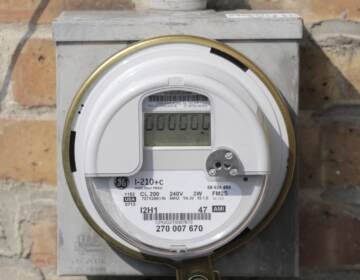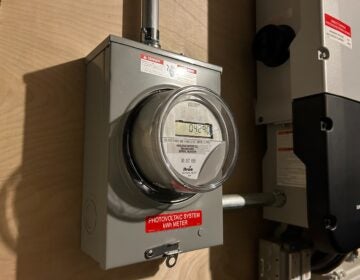‘Perfect storm’: Low-income Delawareans seek crisis assistance for high utility bills as summer temps soar
Limited assistance plagues Delawareans seeking utility assistance. But new laws could help avoid shutoffs.
Listen 3:17
Michael Smyjewski stands in his workshop at his home in Claymont, Delaware. He said he spent six weeks in the dark after his electricity was shut off and couldn't find the money to restore service. (Sarah Mueller/WHYY)
From Philly and the Pa. suburbs to South Jersey and Delaware, what would you like WHYY News to cover? Let us know!
Claymont resident Michael Smyjewski said he sat in the dark for six weeks without air conditioning after Delmarva Power shut off his home’s power in late May.
“It was awful. I had to throw all my food away, hundreds of dollars worth of food,” he said. “Fish, chicken – when that stuff goes bad, look out, because the smell just like permeates the whole house.”

Smyjewski doesn’t have much money. He’s a retired Navy veteran living off Social Security and a small Navy pension. The 74-year-old said he didn’t have the $1,100 needed to avoid the shutoff.
Delaware lawmakers recently passed several pieces of legislation aiming to strengthen the safety net for Delawareans struggling to keep their lights on amid rising prices. But customers continue to fall through the cracks due to limited charitable funding and assistance program restrictions.
Price hikes
Bills are high for a few reasons. Weather and year-over-year rate increases are partly to blame.
Delaware legislators took away Delmarva’s ability to own its own generation in a 1999 law deregulating the state’s energy market. The power supply comes from PJM Interconnection, a regional energy grid servicing Washington D.C. and part or all of 13 states, including all of Pennsylvania, Delaware and New Jersey.
Delaware requires renewable energy to make up a certain amount of supply and there’s not enough of it in the grid. Some critics complain that PJM is not moving fast enough to connect new renewable energy sources to the grid. Others complain the state’s renewable energy requirements are causing higher bills.
Payment plans
Delmarva Power customers saw a rise in gas rates in April and electricity went up in June.
Smyjewski was on a payment plan through Delmarva. He said he was paying $122 a month on the payment arrangement, but didn’t realize he also had to pay the additional monthly charges that accumulated each month for his electricity.
Delmarva Power customers in Delaware can get up to three payment plans in a rolling 12-month period. Then-Public Advocate Drew Slater negotiated the payment arrangement compromise with Delmarva in 2021 as part of a utility tariff, which spells out how an energy provider charges ratepayers for gas and electricity.
Slater said part of the goal was to prevent customers on payment plans racking up thousands of dollars of debt, which would help customers and the company.
“You had a greater opportunity to avoid disconnection,” he said. “And having payment arrangements, it reduces the amount of uncollectible from the utility that would be passed on to all customers.”
But Smyjewski amassed a huge bill anyway. He needed $2,300 to turn his electricity back on. So he asked the company for another payment arrangement.
“I asked, ‘Can you give me a break on this,’” he said. “And she says, ‘Well, you’ve done this before, so we’ve already given you a break.’ So that was the end of that idea.”
Tyler Anthony, CEO of Pepco Holdings, which includes Delmarva Power, told WHYY News that the company will allow more than three payment arrangements in the 12-month rolling period on “a case by case basis.”
If “there’s a good will, say for the customer, and what we’re trying to do for them, then absolutely, we’ll try to work with them,” he said. “The last thing we want to do is cut people off from service.”
But Slater said the company can’t really do that because of the tariff.
“They wouldn’t say instead of three, you can have four,” he said. “They would go by what the tariff says, which isn’t always flexible, right? It’s telling you what you’re allowed to do.”
Crisis funding
Smyjewski spent weeks trying to survive the summer heat without air conditioning while searching in vain for financial assistance. He said temperatures rose to dangerous levels in some parts of his house.
“It was 103 degrees in the bedroom,” he said, adding he “certainly couldn’t sleep in there.”
Smyjewski said he finally contacted the Community Legal Aid Society Inc., which helped him get crisis funding through the Catholic Charities of the Diocese of Wilmington. Catholic Charities operates the Delaware Energy Assistance Program.
Catholic Charities Executive Director Ruth White said Smyjewski was just one of dozens of people who contacted them during that time period on the brink of disconnection.
“Earlier in the summer, when the Delmarva fees were tacked on there, we had a massive increase all at once,” she said. “Since that time, it has leveled off a little bit, but we called that a perfect storm.”
Relief funds
Delmarva has created a customer assistance fund that will provide a total of $4.5 million in relief for limited- and moderate-income customers. Those who qualify can get a $300 credit toward their bill. The state is pitching in another $1.5 million. Anthony said he believes the fund could help about 20,000 ratepayers. The utility has about 324,000 electric customers in Delaware.
“This isn’t going to fix everything, but it’s just another step in the right direction because we’re part of the community,” Anthony said. “When our communities do well, we do well.”
Delmarva also offers assistance programs, such as budget billing and delayed payment options.
Lawmakers created the Delaware Energy Fund for people who meet certain federal poverty income requirements.
Sustainable Energy Utility, a nonprofit also known as Energize Delaware, will administer both funds, said Slater, who is now executive director of the organization. He said his group is setting up how the programs will work and is supplying the $2 million in funding for the Delaware Energy Fund.
New protections for consumers
New laws could help low-income residents like Smyjewski avoid future shutoffs. State lawmakers responded to residents’ frustration with the mounting prices by passing a package of legislation this year. However, none of the bills address payment plans. Lawmakers could make changes to 2021 tariff agreement as part of their authority to change Delaware code.
That package of legislation was signed into law by Gov. Matt Meyer, including the following bills:
- Senate Bill 59 gives the Public Service Commission greater scrutiny over requested rate increases.
- Senate Bill 60 prohibits regulated utilities from using customer funds to pay for any unregulated activities, like lobbying, political contributions and public relations activities.
- Senate Bill 61 requires all votes of the PJM Interconnection Regional Transmission Organization to be public.
- House Bill 62 restricts when or how a utility can shut off or end service.
- House Bill 116 gives the Delaware Public Service Commission the ability to approve lower gas and electric rates for low-income households.
Smyjewski’s air conditioning started humming again earlier this month, but he’s worried about keeping it on. He had to pay a $600 security deposit as part of reconnecting service. His future bills will include the security deposit, amounting to an extra $100 a month for the next six months.
This story was supported by a statehouse coverage grant from the Corporation for Public Broadcasting.
WHYY is your source for fact-based, in-depth journalism and information. As a nonprofit organization, we rely on financial support from readers like you. Please give today.







